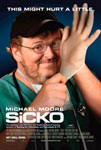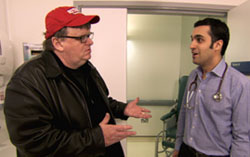Amazing Grace
Babel
Charlotte's Web
Dream Girls
Into Great Silence
Last King of Scotland
Letters from Iwo Jima
The Namesake
Notes on a Scandal
See
2006 films
Michael Moore is at it again, so watch out! This time, Moore takes on the American health care/insurance industry. Moore asks why we as a country can’t do better job attending to the health needs of all our citizens, both insured and uninsured. He compares our largely for-profit health care system with the systems in four other countries: Canada, England, France, and, surprisingly, Cuba. Moore finds that each of the countries provides good care at a cost much lower than ours. Despite what we so often hear, both the public and medical personnel are largely satisfied with the systems in these countries. Moore wonders why we can’t learn from these countries and incorporate changes to our own system. As usual, Moore’s style is quasi-documentary, with plenty of his own satirical humor thrown in for good measure. Moore is often visible in the film, with his trademark baseball cap, asking questions. He even leads a group of people, including 9/11 volunteers, who had been denied medical treatment in this country, to Guantanamo, after hearing reports of how good their health care was. Moore relishes being a lightning rod in his films, stating his bias and calling attention to issues he believes are being ignored. At least, to Moore’s credit, he lays his biases out there, and doesn’t try to hide them.
Sicko concludes with Moore appealing to the compassionate spirit at the heart of Americans to take better care of our own sick brothers and sisters. He ends on a hopeful note: imploring us to look at what other countries are doing well, and incorporate these changes into our own medical system, as we are quick to do in other areas, rather than putting down a blanket condemnation of these systems. I know many people are turned off by Michael Moore. I don’t know if Sicko will change any minds about him. I actually think he is more restrained here than in other films; he doesn’t go around thrusting microphones and cameras in peoples’ faces. But he is still outrageous and satirical in his approach to filmmaking. Like him or not, he makes you think about important issues, like our broken health care system which excludes millions of people from care. I’d certainly cringe if Michael Moore showed up at my office door with a camera and microphone. But, at the same time, for the sake of our society, I have to say I’m glad he’s out there stirring things up. Somebody needs to. Tom Condon, OP
|
The USCCB Office for Film & Broadcasting
classification is A-II -- adults and adolescents. The Motion Picture
Association of America rating is PG-13 -- parents strongly cautioned.
Some material may be inappropriate for children under 13. |




 One thing Moore does well is to tell the stories of ordinary people. In Sicko, he
tells the stories of several people who have suffered because of
deficiencies in our health care system: one couple forced to
move in with their children after declaring bankruptcy when their
insurance was cancelled; a woman whose daughter died when she was
denied treatment at a hospital which was not covered by her HMO,
and several others denied treatment for various reasons. Moore
focuses, not on the indigent, but on working people who are uninsured,
underinsured, or denied coverage.
One thing Moore does well is to tell the stories of ordinary people. In Sicko, he
tells the stories of several people who have suffered because of
deficiencies in our health care system: one couple forced to
move in with their children after declaring bankruptcy when their
insurance was cancelled; a woman whose daughter died when she was
denied treatment at a hospital which was not covered by her HMO,
and several others denied treatment for various reasons. Moore
focuses, not on the indigent, but on working people who are uninsured,
underinsured, or denied coverage.